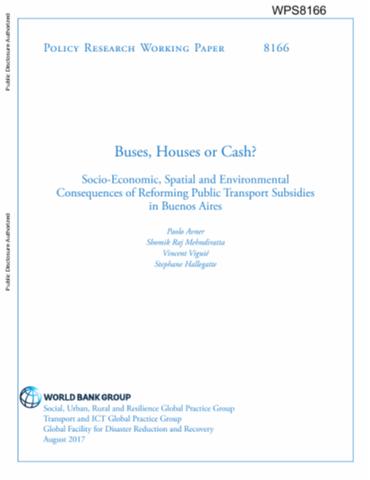Resource information
Transit subsidies in the urban area of Buenos Aires are high, amounting to a total of US$5 billion for 2012. They have been challenged on several counts: suspected of driving urban sprawl and associated infrastructure costs, diverting resources from system maintenance, and failing to reach the poor among others. In this context, this paper examines the impacts of cost recovery fares under a range of different policy scenarios that could cushion the impact of fare increases. The alternative scenarios that are scrutinized are the uncompensated removal of the transit subsidy, its replacement by a lump sum transfer, and its replacement by two different construction subsidy schemes. Using a dynamic urban model (NEDUM-2D) calibrated for the urban area of Buenos Aires, all scenarios are assessed along four dimensions: (i) the efficiency/welfare impact on residents, (ii) the impacts on the internal structure of the urban area and sprawl, (iii) the impact on commuting-related carbon dioxide emissions, and (iv) the redistributive impacts, with a focus on the poorest households. A series of results emerge. First, there are consumption-related welfare gains for residents associated with replacing the transit subsidy by a lump sum transfer. Second, there are only moderate reductions in urbanization over time and thus infrastructure costs associated with the subsidy removal. Third, the replacement of the transit subsidy leads to only moderate increases in carbon dioxide emissions despite lower public transport mode shares, because households will chose to settle closer to jobs, thereby reducing commuting distances. Finally, the replacement of the transit subsidy by a lump sum transfer will lead to short-term harsh redistributive impacts for captive transit users in some areas of the urban area. Medium-term adjustments of land and housing prices will partially mitigate the negative impacts of higher transport costs for tenants, but will further hurt homeowners.


